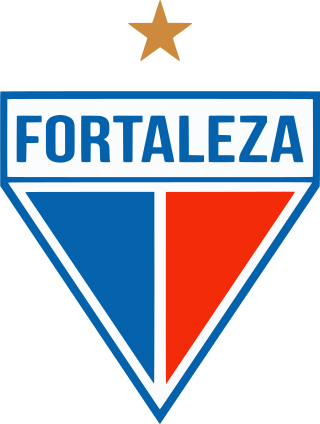
Clube Náutico Capibaribe, or simply Náutico, is a Brazilian multi-sport club based in Recife, Pernambuco. The club is most notable for its association football team, that plays in the Série C, the third tier of the Brazilian football league system, as well as in the Campeonato Pernambucano, the top division in the Pernambucano state football league system.

Fortaleza Esporte Clube, usually known as Fortaleza, is primarily a football club, but is active in other sports such as futsal, handball and basketball. Fortaleza Esporte Clube is based in Fortaleza, capital of the State of Ceará, Brazil. The club was founded on October 18, 1918.
The Torneio Roberto Gomes Pedrosa, also known as Taça de Prata, or nicknamed Robertão, was an association football competition contested in Brazil between 1967 and 1970 among soccer teams from São Paulo, Rio de Janeiro, Rio Grande do Sul, Minas Gerais and Paraná states. It was an important soccer tournament, being considered a predecessor to the Brazilian Championship induced in 1971. Thus in 2010 the Brazilian Football Confederation decided to consider the winners of the Robertão as Brazilian champions. The 1st edition of the tournament was organized by Federação de Futebol do Estado do Rio de Janeiro and Federação Paulista de Futebol.
Galícia Esporte Clube is a Brazilian football club from Salvador, capital of the state of Bahia, in Brazil's northeast region.

America Football Club, usually abbreviated to America-RJ or simply America, is a Brazilian football team based in the city of Rio de Janeiro, in the northern neighborhood of Tijuca. The team compete in Campeonato Carioca, the top tier of the Rio de Janeiro state football league.

Clube do Remo, commonly referred to as Remo, is a Brazilian professional club based in Belém, Pará founded on 5 February 1905. It competes in the Campeonato Brasileiro Série C, the third tier of Brazilian football, as well as in the Campeonato Paraense, the top flight of the Pará state football league.

América Futebol Clube, commonly referred to as América de Natal, is a Brazilian professional club based in Natal, Rio Grande do Norte founded on 14 July 1915. It competes in the Campeonato Brasileiro Série C, the third tier of Brazilian football, as well as in the Campeonato Potiguar, the top flight of the Rio Grande do Norte state football league.
The Torneio Rio – São Paulo was a traditional Brazilian football competition contested between São Paulo and Rio de Janeiro teams from 1933 to 1966, in 1993 and from 1997 to 2002.

Copa dos Campeões was a Brazilian football competition, organized by the Brazilian Football Confederation (CBF), contested by the best teams from each one of the regional cups.

Copa do Nordeste, also known as Campeonato do Nordeste or Copa Nordeste, and sometimes informally referred as Lampions League – in reference to the UEFA Champions League and bandit folk hero Lampião, is a Brazilian football competition among Northeastern region teams.

The Campeonato Brasileiro Série A, commonly referred to as the Brasileirão, and also known as Brasileirão Assaí due to sponsorship with Assaí Atacadista, is a Brazilian professional league for men's football clubs. At the top of the Brazilian football league system, it is the country's primary football competition. Contested by 20 clubs, it operates on a system of promotion and relegation with the Campeonato Brasileiro Série B. In 2021, the competition was chosen by the IFFHS as the strongest national league in South America as well as the strongest in the world.

Esporte Clube Ypiranga is a football team of Salvador, Bahia. Its colours are yellow and black.
The 2020 Copa do Nordeste was the 17th edition of the main football tournament featuring teams from the Brazilian Northeast Region. The competition featured 16 clubs, with Bahia, Ceará and Pernambuco having two seeds each, and Rio Grande do Norte, Sergipe, Alagoas, Paraíba, Maranhão and Piauí with one seed each. Four teams were decided by a qualifying tournament. The tournament began on 21 January and ended on 4 August.
The Torneio do Norte was a football competition held between 1968 and 1971. The champion of the tournament gained a place in the Torneio Norte-Nordeste of the same year.
The 1968 Torneio do Norte was the first edition of a football competition held in Brazil, featuring 9 clubs. In the finals, Remo defeated Piauí 2–1 in the playoff game, after losing the first game 5-1 and winning the second 4–1 to win their first title and earn the right to play in the finals of 1968 Torneio Norte-Nordeste.
The 1970 Torneio do Norte was the third edition of a football competition held in Brazil, featuring 6 clubs. Fast Clube won your first title and earn the right to play in the 1970 Torneio Norte-Nordeste.
The 1968 Torneio Norte-Nordeste was the first edition of a football competition held in Brazil. In the finals, Sport Recife defeated Remo 5–2 on aggregate to win their first title and earn the right to play in the Torneio dos Campeões da CBD.
The Torneio Centro-Sul, was a football competition held during the years of 1968 and 1969, reuniting clubs of the part south of Brazil as a qualifier for the Torneio dos Campeões da CBD, likewise Torneio Norte-Nordeste. The tournament had only two editions, but ended up being abandoned due to lack of interest from clubs and the discontinuity of the Torneio dos Campeões.
The 2002 Torneio Rio São Paulo was the 26th and the last edition disputed of the Torneio Rio-São Paulo. It was the edition with the most participants involved, and it was expected to be at the top of the pyramid of Campeonato Paulista and Campeonato Carioca.








